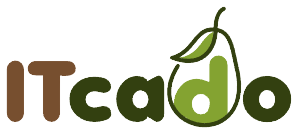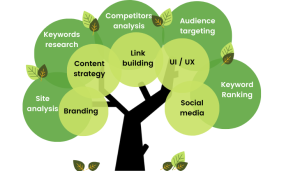How An On Page SEO Expert Doubled My Organic Traffic
For any business, getting higher in search results is important for getting new customers. Even though a lot of companies put money into great content and web design, they still have trouble standing out. You can tell the difference with an on page SEO service.
This guide will show you the proven strategies that have helped a lot of businesses double their online traffic in just a few months. There are simple explanations for each tip, along with real-life examples that you can use on your own website, whether you run an IT company, an online store, or some other kind of business.
Targeting the Right Keywords with an On Page SEO Expert
The Problem
Many businesses guess at keywords instead of researching what potential customers are typing into Google.
The Solution
Use tools like Google Keyword Planner or Ahrefs to find:
- Commercial intent phrases (e.g., “managed IT services for small businesses” instead of just “IT services”)
- Long-tail questions (e.g., “How much does IT support cost?”)
Example Before & After
- Old Blog Title: “SEO Solutions Basics”
- New Blog Title: “SEO Services for Small Businesses: 5 Cost-Effective Solutions”
Why It Works
Websites that are designed for real search questions show up higher in search results and get more qualified visitors.
Writing Compelling Titles & Descriptions
The Problem
Weak meta titles and descriptions lead to low click-through rates (CTR) from search results.
The Solution
- Keep titles under 60 characters.
- Include the main keyword naturally.
- Add a clear benefit or CTA.
Example Before & After
- Old Meta Description: “We provide IT support. Contact us today.”
- New Meta Description: “Affordable IT support for Dallas businesses—24/7 monitoring, cybersecurity, and fast response times. Get a free consultation today!”
Why It Works
A well-written snippet entices users to click, improving CTR and rankings.
Optimizing Images for Search & Speed
The Problem
Most websites use generic image names (like “IMG_1234.jpg”), missing out on Google Images traffic.
The Solution
- Rename files descriptively (e.g., “small-business-server-security-2024.jpg”).
- Add alt text for accessibility.
- Compress images to improve load times.
Example Before & After
Before:
- File name: “office-network.jpg”
- Alt text: “Office computers”
After:
- File name: “secure-office-network-setup-dallas.jpg”
- Alt text: “Professional IT setup for Dallas small businesses”
Why It Works
Optimized images rank in Google Images, bringing extra traffic.
Speeding Up Your Website
The Problem
Slow sites frustrate visitors and hurt rankings.
The Solution
- Compress images (TinyPNG, ShortPixel).
- Enable browser caching.
- Use a fast hosting provider.
Result
One client reduced load time from 4.5 seconds to 1.8 seconds, cutting bounce rates by 20%.
Strategic Internal Linking
The Problem
A lot of blogs and service pages are on their own, so they miss out on chances to lead users deeper into the site.
The Solution
Link related content naturally, like:
“For more tips, see our guide on small business cybersecurity best practices.”
Why It Works
Backlinks help search engines understand how your site is structured and keep people interested.
Writing Naturally (No Keyword Stuffing)
The Problem
It sounds effortless when you force keywords into the material.
The Solution
Write for real people first, then optimize.
Example Before & After
Before:
- “Best IT services IT support Dallas IT company.”
After:
- “Looking for reliable IT support in Dallas? Our team offers 24/7 monitoring, cybersecurity, and fast response times.”
Why It Works
Google rewards readable and helpful content.
Fixing Broken Links
The Problem
Dead links harm user experience and SEO.
The Solution
Use Screaming Frog to find and:
- Update broken internal links.
- Redirect old URLs (301 redirects).
Result
One client saw a 15% rankings boost after fixing broken links.
Clean, SEO-Friendly URLs
The Problem
Messy URLs like “example.com/?p=123” confuse users and search engines.
The Solution
Use clear structures like:
- Before: example.com/services?id=5
- After: example.com/managed-it-services-dallas
Why It Works
Descriptive URLs improve click-through rates.
Optimizing for Local Searches
The Problem
Many businesses miss local customers searching for services nearby.
The Solution
- Claim your Google Business Profile.
- Build local citations (Yelp, BBB).
- Add location pages (e.g., “IT Support in Dallas”).
Result
One IT company ranked #1 for “managed IT services Dallas” in a few months.
Key Takeaways
- Do not just target business popular phrases, but real customer searches as well.
- Technical SEO (speed, mobile-friendliness) and on-page SEO service is as important as content.
- Natural, helpful content always wins long-term.
Next Steps
- Run a free SEO audit (try Google Search Console).
- Pick 2-3 strategies to implement this week.
Final Thoughts
Not only does a well-optimized website get visitors, it gets the right visitors. Businesses can greatly improve their search results, get more quality leads, and eventually make more money by using the help of our on page SEO expert. These strategies work for all kinds of businesses, from IT service providers to online stores to small shops in your own town.
ITcado LLC focuses on creating data-driven SEO plans that are precisely matched to your company’s objectives. Our team of experts will look over your site, make sure it ranks better, and improve the information you already have. This way, you can focus on what you do best.



